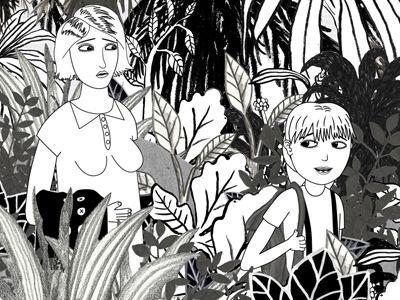The title of the new animation Virus Tropical turns out to be a slight misdirection. More specifically yet, it's a misdiagnosis: what a doctor claims a woman who's actually in the first trimester of a pregnancy is suffering from, causing our heroine, at that stage just an unacknowledged foetus, to think of herself in later life as an ever-swelling collection of cells, a mutation of sorts. The film that follows takes shape, after the graphically and thematically similar Persepolis, as another example of an animator telling her own story. In this case, we're revisiting the childhood and adolescence of the graphic novelist known as Powerpaola, born in Quito, Ecuador in 1977, and encountered here first as an adorably round-faced infant born to a homemaker and a significantly older retired priest; then as a doe-eyed scribbler learning that her already distant dad is moving to neighbouring Colombia, leaving her to grow up in a houseful of women; and then again as a pimply teenager, rocking out with unsuitable boys on the school bus to the apparently deathless strains of Warrant's "Cherry Pie", before going on to demonstrate certain alternative tendencies. That biological title proves accurate in one respect, for the film's real subject is growth: it establishes one constant, in the Almodóvarian figure of the adoring, put-upon mother, and promptly follows her offshoots - three daughters, representing subtly varied strains of femininity - as they feel their way out, sometimes haphazardly, into the wider world.
Their progress is mapped a touch skittishly, in part because director Santiago Caicedo sets about his source material with the restlessness of the reader who simply cannot wait to get onto the next panel, the next anecdote, the next volume. The downside is that we don't quite get a feel for Quito (or Paola's eventual destination Cali) as a place, and only a fleeting sense of the houses our heroine passed through as homes. (In this respect, Persepolis holds the advantage: I wondered whether Caicedo might have been better off devoting these 97 minutes to one specific time period, and leaving the door open for sequels the audience would almost certainly want.) The not inconsiderable consolation is some exceptionally strong characterisation, linked inexorably to Powerpaola's original design. These women have the most expressive eyes seen in any animation for some while, and time has equally been taken on the film's walk-on players and background figures; every character seems to have a story to tell, which may explain why Caicedo is often caught rushing to get to and past them. Occasionally, the camera slows long enough to capture an exquisite touch: a squiggle passing for a cassette tape, a telenovela sketched in the pencil lines of A-Ha's "Take on Me" video, Barbie and Ken dolls getting up to progressively more adult activity in parallel with Paola's development. (Viewers who've spent weeks looking over the shoulders of correspondents on televised Zoom calls will also find much to pore over on the family's bookshelves.) You might miss the political context of Persepolis, which unfolded about the same time on a very different spot on this planet; Powerpaola is engaged with the comparatively commonplace crises of youth, a moment when, for her, spilling ink on her new trainers was as bad as things got. Nevertheless, this is a lovely, detailed, supportive world to escape into for a while. If you needed a film to give you a hug at the end of a tough week, Virus Tropical - despite its title - would be where to turn.
Virus Tropical is now streaming on MUBI UK.

No comments:
Post a Comment